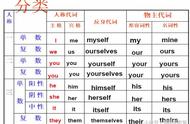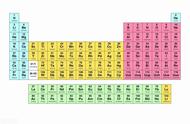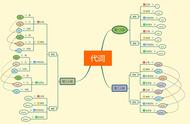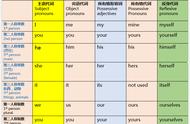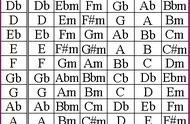all强调整体地考虑总体,all指人时看作复数,指物时看作单数。all后接复数名词。All was destroyed in the big fire.

all指三者及其以上的“所有,全部”。

all与定冠词,指示代词,物主代词连用,放在其前面。
与not连用表示部分否定。
all还可后接of短语. There is room for all of us.
every:
强调考虑总体中的所有成员(与all很接近,有时可以互换),区别如下:All are present.=Everyone is present. 一般情况下every和单数名词搭配,all和复数名词搭配。
every 后必须接名词,既不能单独使用也不能后接 of 短语,如:Every child enjoys Christmas.
All children enjoy Christmas.
every和not连用表示部分否定。
each:
each既可单独使用,也可后接名词.
指两者或两者以上的“每个”, 着重于个别概念.
each可以与of连用后接n.的复数以及代词的复数,each of短语做主语谓语动词用单数。如:Each of us has a book.
each所有格一般为his。如:Each must do his duty.
Two men came into the room. Each carried an umbrella.
Each/Every book on this desk is worth reading.
5. other, the other, another, others的用法。
Other:另外的,别的,其他的,一般不单独使用,常和the和this,some,any,each,every,no,one和形容词性物主代词连用。后接单数名词。
The other:只两者中的任何一个,后接单数名词。但是the other后接名词复数或者是the others表示其余的全部。
Another:指三者及其以上的另外一个。another后一般要单数可数名词,但若其后的名词有数词或 few 修饰,表示又再还,也可接复数名词。如:I've got another five minutes.
others(其后不接名词)=other n. 意为别的人或物。Some…others…一些…另一些…
如:
Show me some others. 再拿一些给我看。
Show me another. 另拿一个给我看。
We should think of others. 我们应该多为别人着想。
Where are the other students? 其他同学在哪里?
6. no one, nobody, none 的用法
1. 从所指代的名词来看
no one=nobody,两者均只能指人不指物,且其后不可接表示范范围的of短语;而none 既可指人也可指物,且其后通常要接表示范围的of短语。如:Almost no one [nobody] believed her.
None of the keys would open the door.
2. 从单复数意义来看
no one=nobody均表示单数意义,用作主语时,谓语动词也用单数;而none用作主语时,若指不可数名词,谓语只能用单数,若指可数名词,则谓语可用单数(较正式)也可用复数(用于非正式文体)。如:None of this money is mine.
None of my friends is [are] interested. 我的朋友没有一个感兴趣。
3. 从否定的范围来看
none通常否定的是一种数量,即指数量上“一个也没有”,而 no one 或 nobody 则往往表示一种全面否定,即指“谁都没有”。正因为none否定的是一种数量,所以在回答how many 或 how much 的提问时,通常用none,而在回答 who 的提问时,通常用 no one 或 nobody。如:
---How many persons are there? ----None.
---Who is here? ---Nobody.
7. 复合不定代词的用法。复合不定代词主要包括 something, somebody, someone, anything, anybody, anyone, nothing, nobody, no one, everything, everybody, everyone 等,它们在句中可用作主语、宾语或表语,但不能用作定语。其中使用时应请注意以下几点:
(1) 受定语修饰时,定语应置于其后。
如:Tell us something interesting. There was nobody tired. Everything is ready,isn’t it? Nobody is ready, is he?
(2) 指人的复合不定代词若用作主语,其谓语动词一般用单数,相应的人称代词和物主代词也用单数 he, him, his (不一定指男性)。但在非正式文体中常用复数代词 they, them, their。指物的不定代词相应的人称为it。如:
If anybody [anyone] comes, ask him [them] to wait. 要是有人来,让他等着。
(3) anyone, everyone 等只能指人,不能指物,且其后一般不接of 短语。若是指物或后接 of 短语,可用 any one, every one (即分开写)。
. something, someone 等和 anything, anyone等的区别与 some 和 any 的区别一样,前者一般用于肯定句,后者一般用于否定句、疑问句或条件句。
It的用法1、指示代词it:在特定的环境中,it可指代人,也可指性别不明,婴儿或身份不明的人。
如:What a beautiful baby--is it a boy?
2、人称it:代替前面或后面的单数名词或分句所表示的事物。
如:I was disappointed with the film. I had expected it to be much better.
3、无人称it:用作非人称代词,表示时间、天气、距离、温度、环境等。如:It is going to rain.
It’s about 15 minutes’ walk from here to the bar.
四:形式主语
It作形式主语常见句型
动词不定式,动名词或主语从句作主语时,通常把它们放在谓语动词前,而用it作形式主语,放到句首,常见句型有:
1. It be 形容词 主语从句,
如: It is uncertain whether he can come to Jenny’s birthday party or not.
2. It be 名词词组 主语从句,这类名词有:a fact, a pity, a shame, an honour,a question等,如:
It’s a pity that you missed the exciting football match. It remains a question whether he will come or not.
3. It be 过去分词 主语从句,这类过去分词有:announced, believed, expected, hoped, decided, reported, said, shown等, 如:
It is reported that 16 people were killed in the earthquake.
It is not decided who will give the operation to the patient.
4. It 不及物动词(seem, appear, happen等) 主语从句, 这类不及物动词有:appear, happen, seem等, 如:
It seemed that he didn’t tell the truth.
It happened that I was out when he called.
5. It be 形容词 for sb. to do sth 表示事物特征
这类句型常用形容词easy, difficult, hard, important, possible,wise等作表语,有时候为了强调不定式动作的执行者,常在不定式前加for sb,如:
It’s necessary for the young to master two foreign language.
It is unwise to give the children whatever they want.
这类形容词有:easy, difficult, hard, important, possible, wise
6. It be 形容词 of sb. to do sth,这类形容词常是表示心理品质,性格特征的形容词,如:kind, nice, clever, foolish, impolite, silly, considerate等。某人和这些形容词可以构成主系表结构。如:
It’s very kind of you to help me with the work. =You are kind to help me.
It seemed selfish of him not to share his dictionary with others. =He seemed selfish not to share his dictionary with others.
7. It be 名词词组 动词不定式,如: It is not a good habit to stay up too late.
8. It be 名词或形容词 动名词,这类名词和形容词常常是:good, no good, no use, a waste of, useless, senseless,no pointt等,如:
It’s a waste of time talking to her any more.
It is no use arguing about the matter with him.
9. It take ( sb. ) 时间(金钱) 动词不定式,如: It took the workers almost three years to finish building the dam. It will take a whole day to get to the top of the mountain on foot.
五:it 与时间相关的句式归纳:
1 It takes sb some time (时间段) to do sth 花费某人多少时间做某事
② It is (high / about) time that sb did / should do (是某人该做某事的时候了。从句动词须用过去式或should 动词原形,should千万不能省,high, about表示强调)。
例:It’s high time that you worked hard at your lessons. / you should work hard at your lessons.
③ 第几次做某事的句型
It (this) is the first time that clause (从句用现在完成时)
例:It is the second time that you have come late for school this week.
It (this) was the first time that clause (从句用过去完成时)
例:It was the third time that we had visited the Great wall.
④ It was / is / will be some time (时间段) before …(过多久才…,该时间段较长,常用词汇:minutes, hours, days, weeks months, years, along time, etc.)
例如:It will be 120 days before Beijing hosts the 29th Olympics.
It was / is will be not some time (时间段较短) before (没过多久就…)
例如:It won’t be very long before we leave school.
⑤ It is / has been some time (时间段) since…(自从…以来,多久了。)since从句为一般过去时态.
例如:① It’s 2 years since he smoked. (他戒烟两年了)
② It has been 3 years since we last met. (我们已有三年不曾见面了)
6、It was 时间点 when (引导定语从句)。注意:it指时间,该时间前无介词,一般为具体时间,注意与强调句区分。强调句:1).It is 被强调的部分 that如果被强调的部分为时间状语,则为完整的时间。带有介词2).It is/was not until...that...
例:① it was 8 a.m when I got up.
② it was at 8 a.m that I got up.(强调句)
六: it常见的固定搭配
take it easy别着急 make it成功 get it明白 catch it受处罚 take it买了 as sb. puts it正如某日所说
When it comes to...当谈及。。。时 That’s it.那就对了。
I can’t help it.我没有办法。
七:it做形式宾语
1. it代替不定式短语think/ find/ feel/ consider/ make/ regard… it 形容词/名词 不定式短语如:I find it pleasant to work with him.
2.it代替动名词短语,只限于少数句型。如:
The professor consider it no good reading without understanding.
Do you consider it any good trying again?
He found it useless(no use)arguing with him.
He thought it absolutely senseless attempting the impossible.
I don’t think it worthwhile going to such a place.
3. V. it when/if从句。常见于appreciate, enjoy, like, dislike, love, hate, prefer等少数动词。如:
We would much appreciate it if you could do us that favour.
4. V. it that从句。常见于like, take, have, put等少数动词后。如:
I take it that they will succeed sooner or later.
5. V. it 介词短语 that从句。常见于bring it to one’s attention, owe it to sb, take it for granted等结构中
如:I took it for granted that they were not coming.
6. V. 介词短语 it that从句。常见于answer for, depend on, insist on, look to, see to, stick to等结构中。如:
I’ll see to it that everything is ready in time.
7. V. it 过去分词 从句。常见于几个可以带过去分词做宾语补足语的动词后。一感二听三使五看。如:
They haven’t made it known where the meeting is to take place.
,